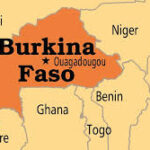A 22 year-old French worker whose last name has not been released, has accused a French police officer of forcing a truncheon inside his rectum during a violent encounter with multiple officers in Aulnay-sous-Bois, a suburb north of Paris, the Washington post reports.
Theo maintains that the incident began after he witnessed an officer slap someone and approached a group of officers, according to Huffington Post.
He claimed that the group took him around a corner and attacked.
“I didn’t try to run away. I told the officers, ‘You’ve torn my bag,’ to which they replied that they didn’t give a damn,” he said, Huffington Post reported.
“They all tried to grab me. I asked them why they were doing this, but they just continued to throw insults at me.”
“He told me to put my hands behind my back.
They put handcuffs on me and then they told me to sit down,” he added.
“They sprayed tear gas in my face, and then I had a pain in my buttocks. My trousers were lowered. I was in serious pain.”
During the violent encounter, Théo said, officers spit on him and called him such names such as “Negro” and “bitch.”
Police claimed that during the interaction, Théo’s pants “slipped down on their own.”
A police source told the Local that video taken at the scene and being reviewed by investigators shows a policeman “applying a truncheon blow horizontally across the buttocks.”
More than a week later, after protests have roiled residents where the incident occurred, French investigators have reached an entirely different conclusion: The violent sodomy was accidental and occurred when the officer’s expandable baton happened to slip into the victim’s anus.
While noting that the violent encounter was “very serious,” the investigation by France’s national police force determined that the incident was “not a rape” because of the “unintentional character” of the penetration, according to Huffington Post’s French edition.
On Tuesday, Théo was visited by French President François Hollande, who tweeted that “Théo reacted with dignity and responsibility.”
Théo a réagi avec dignité et responsabilité. La justice a été saisie, il faut lui faire confiance. Elle ira jusqu’au bout. pic.twitter.com/YRlpdFXII6
— François Hollande (@fhollande) February 7, 2017
Hollande’s visit did little to quell the fury of rioters, who in recent nights have “aimed large fireworks at police and set fire to cars and garbage bins” in the “working-class region northeast of the French capital with a large minority population” known as Seine-Saint-Denis, according to the Associated Press.
Between Wednesday night and Thursday morning alone, the AP reported, police arrested 26 people.
On Saturday, protests continued, with hundreds marching in demonstration, according to the AP. Some protesters reported lit a vehicle afire, while others threw projectiles at police.
Officers responded with tear gas.
Théo and his family are urging the community to act peacefully.
“I would like to ask the residents of my neighborhood to calm down,” he told the French news station BFMTV.
“I ask them to stop the hostilities because I love my city and I want to find it the way I left it.”
“Violence is not the way to support me,” he added.
“Justice will do its job.”
Bruno Beschizza, the conservative mayor of Aulnay-sous-Bois, has described Théo as a “respectable” young man whose family has been “psychologically destroyed” by their relative’s suffering.
In a statement posted on Facebook Thursday, Beschizza acknowledged that “tensions remain palpable” in Aulnay-sous-Bois and called for peace.
“Justice has been seized,” the statement said.
“The indictments were decided. Lawyers have been chosen. The presumption of innocence is respected. The Case will be judged in respect for the rights of each of the parties.”
“So we are now in the judicial time concerning the case of Théo,” the statement added.
“This time must be respected. Justice must be able to work in complete transparency and in complete serenity.”
Yasser Louati, a French human rights and civil liberties activist, told Al Jazeera that the riots are fueled by the fact that the police are now viewed “as an occupying force, not a force of protection for the weak and against crime.”
“There is an atmosphere of open defiance to the state … the fear is that this might spark riots before the election, [which] may be a blessing for the right and far right,” he added.

 Join Daily Trust WhatsApp Community For Quick Access To News and Happenings Around You.
Join Daily Trust WhatsApp Community For Quick Access To News and Happenings Around You.


